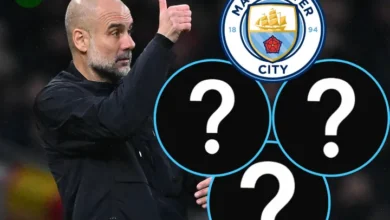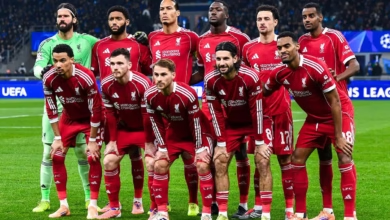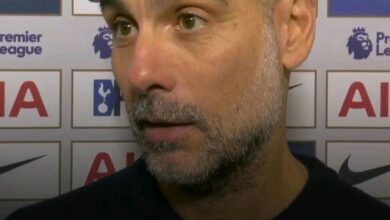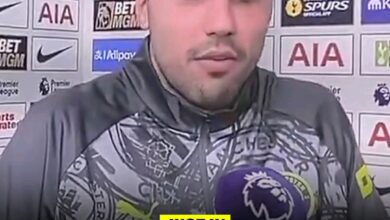Roy Keane want guardiola to sell man city star after what he did yesterday he edont deserve to wear City shirt
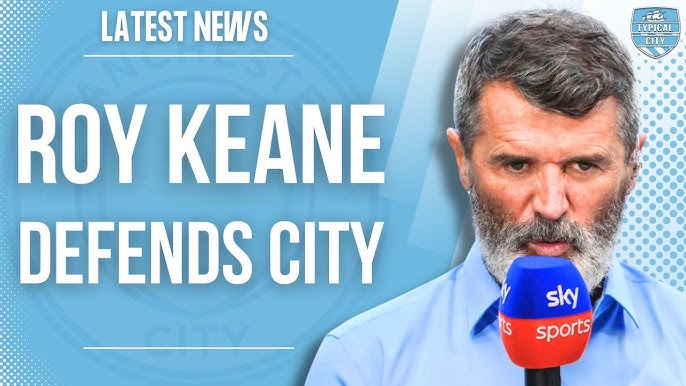
At the heart of the post-match analysis was Roy Keane, the former Manchester United captain whose reputation for uncompromising honesty has made him one of football’s most respected voices. His target? Kyle Walker, the Manchester City defender whose performance encapsulated everything wrong with England’s approach on a night when standards slipped dangerously low.
The Moment That Defined the Evening
The controversy centered around Senegal’s equalizing goal, scored by Ismaila Sarr just before halftime. England had taken the lead through Harry Kane, their talismanic captain providing the kind of clinical finishing that has made him one of the world’s premier strikers. For a brief moment, it seemed as though Thomas Tuchel’s experimental lineup might navigate through what many expected to be a comfortable evening against African opposition.
However, football has a cruel way of exposing complacency, and Senegal’s leveler arrived through a passage of play that would become the focal point of intense scrutiny. A seemingly innocuous long ball was lofted toward the England penalty area, the kind of aerial threat that experienced defenders should handle with routine efficiency. The ball was nodded back across the box, creating the kind of dangerous situation that requires immediate defensive awareness and positioning.
It was here that Walker’s positioning and reaction became the subject of Keane’s withering assessment. As Sarr ghosted into the box, Walker appeared to be caught flat-footed, his positioning suggesting a player who had switched off at a crucial moment. The Senegal forward was able to get ahead of the England defender and fire home with relative ease, leaving Walker sprawled on the turf as the African team celebrated their equalizer.
Keane’s Unflinching Analysis
Speaking to ITV in the immediate aftermath of the goal, Keane delivered one of his trademark assessments that cut straight to the heart of the matter. His words carried the weight of someone who had spent his entire career demanding the highest standards from teammates and opponents alike.
“You know what, if this is a young right-back coming into the game, you are thinking inexperience,” Keane began, his tone measured but building toward something more damning. “But do you know what I think, people will say it’s a lack of concentration, I think he is being lazy. I think he is being lazy here.”
The use of the word “lazy” was particularly significant coming from Keane, a player whose entire philosophy was built around maximum effort and uncompromising commitment. For the Irishman, laziness represents the cardinal sin in professional football – a betrayal of teammates, supporters, and the shirt itself.
Keane continued his analysis with characteristic directness: “He is a vastly experienced player who can’t be bothered getting back in. As you know, tell defenders to get back in, and if it comes in you are ready for it. He is just on his heels, he almost can’t be bothered to get back.”
The criticism went beyond the technical aspects of defending to question Walker’s fundamental attitude and application. This wasn’t about a momentary lapse in concentration or a technical error – it was about a player failing to meet the basic requirements of professional football at the highest level.
The Broader Context of Walker’s Struggles
Keane’s criticism must be understood within the broader context of Walker’s recent experiences both at club and international level. The Manchester City defender has endured a challenging period, with his personal life becoming the subject of intense media scrutiny following revelations about his private affairs. The pressures of maintaining focus while dealing with off-field issues have clearly taken their toll.
However, Keane was unsympathetic to these circumstances, emphasizing that professional footballers must find ways to compartmentalize their personal issues when representing their country. “I know he has had a difficult few months but for a vastly experienced player, you can’t be making mistakes like that,” he stated, drawing a clear line between personal circumstances and professional responsibilities.
This perspective reflects Keane’s own approach during his playing career, when he consistently delivered high-level performances despite facing his own share of controversies and personal challenges. The expectation that players should be able to separate their private lives from their professional duties is a fundamental tenet of Keane’s football philosophy.
Leadership Vacuum and Accountability
Keane’s analysis extended beyond Walker to encompass broader issues within the England setup, particularly around leadership and accountability. He was particularly critical of goalkeeper Dean Henderson’s response to the goal, suggesting that experienced players should be holding their teammates accountable in real-time.
“He [Dean Henderson] should also show maturity once the goal goes in, putting the mans on people,” Keane observed. “We mentioned that before the game, standards in the group. He should be looking at Walker, as experienced as Walker is, saying: ‘Why aren’t you getting back in?’ Start pointing fingers, put the mans on people.”
This criticism highlights a recurring theme in Keane’s analysis of modern football – the absence of the kind of on-field leadership that was commonplace during his own playing career. The image of teammates challenging each other, demanding higher standards, and refusing to accept substandard performances has become increasingly rare in contemporary football.
The concept of “putting the mans on people” speaks to a more confrontational approach to team management, where players are expected to police each other’s performances and maintain collective standards through peer pressure and accountability. It’s a philosophy that harks back to an era when dressing room dynamics were more hierarchical and unforgiving.
Pattern of Underperformance
Keane’s criticism wasn’t limited to the Senegal game alone but formed part of a broader pattern he had observed in England’s recent performances. “Every time I watch England going back over the last few games I just think they can do a lot more,” he noted. “It’s as if they are waiting to concede a goal and wait for a setback.”
This observation touches on one of the most persistent criticisms of England under various managers – a tendency toward passive play and reactive rather than proactive approaches to games. The suggestion that England players appear to be “waiting” for negative events to unfold speaks to a mentality issue that goes beyond individual errors.
The psychological aspect of England’s performances has been a recurring theme throughout their recent history. Despite possessing technically gifted players and tactical sophistication, there remains a sense that the team lacks the mental fortitude and killer instinct required at the highest level of international football.
The Missed Opportunities Factor
Keane also highlighted the cumulative effect of missed opportunities throughout the match, noting that Anthony Gordon’s failure to convert a clear chance earlier in the game had contributed to England’s eventual downfall. “Saying that [Anthony] Gordon should score. If he scores you are 2-0 up, so you have got Gordon not scoring, Walker making mistakes, so ultimately there are question marks over some of these players.”
This analysis demonstrates the interconnected nature of football, where individual errors and missed opportunities can have cascading effects throughout a match. Gordon’s missed chance, while not directly related to Walker’s defensive error, created the conditions where England remained vulnerable to Senegal’s response.
The mention of Gordon’s miss also highlights the collective responsibility for the defeat, rather than placing all blame on Walker alone. However, Keane’s emphasis on “question marks over some of these players” suggests that certain individuals are failing to meet the standards required for international football.
Tuchel’s Tactical Gamble
The match also represented one of Thomas Tuchel’s early experiments as England manager, with the German making ten changes from the previous lackluster victory over Andorra. Only Harry Kane retained his place in the starting lineup, wearing the captain’s armband in what was supposed to be an opportunity for fringe players to stake their claims for regular inclusion.
Tuchel’s decision to rotate so heavily reflected both the nature of the fixture and his desire to assess his squad depth ahead of more significant challenges. However, the performance raised questions about whether such wholesale changes compromise team cohesion and understanding, particularly in defensive phases of play.
The integration of new players into established systems requires time and communication, elements that were clearly lacking in the build-up to Senegal’s goals. Walker’s positioning error could be partly attributed to unfamiliarity with his defensive partners, though Keane’s analysis suggests that such excuses are unacceptable at international level.
Senegal’s Clinical Finishing
While much of the post-match focus centered on England’s defensive frailties, credit must also be given to Senegal’s clinical approach to the game. After falling behind to Kane’s opener, the African team showed tremendous character and tactical discipline to not only equalize but go on to claim a convincing victory.
The equalizing goal, while exposing Walker’s poor positioning, also demonstrated Sarr’s predatory instincts and finishing ability. The Watford forward’s movement and timing were exemplary, ghosting into dangerous positions and maintaining composure under pressure to beat Dean Henderson.
Senegal’s second goal, scored by Habib Diarra, came from another long ball that caught England’s defense unprepared. The pattern of conceding from aerial balls and long passes suggested systemic issues rather than isolated individual errors. Cheikh Sabaly’s late goal provided the emphatic finishing touch to a performance that will be remembered as one of Senegal’s finest in recent years.
Competition for Places
Walker’s poor performance came at a particularly inopportune time, given the intense competition for the right-back position in England’s squad. Players like Trent Alexander-Arnold, Reece James, and Tino Livramento are all vying for regular inclusion, each offering different tactical attributes and approaches to the position.
Alexander-Arnold brings exceptional crossing ability and set-piece delivery, while James offers pace and attacking thrust down the flank. Livramento represents the future, with his pace and defensive solidity making him an attractive option for Tuchel’s system. Walker’s experience and leadership qualities have previously given him an advantage, but performances like the one against Senegal threaten to undermine his position.
The competition for places should theoretically drive higher standards and improved performances, but Keane’s analysis suggests that some players may be taking their positions for granted. The comfort of knowing that few alternatives exist can lead to complacency, a dangerous mindset at international level.
Historical Context of England’s Defensive Issues
England’s defensive vulnerabilities are not a new phenomenon, with the team having struggled with consistency at the back for several years. From the 2018 World Cup semi-final defeat to Croatia, through various Nations League disappointments, to the Euro 2020 final penalty shootout loss, defensive lapses have consistently undermined England’s ambitions.
The pattern of conceding crucial goals at important moments has become a recurring theme, suggesting that the issues run deeper than individual errors. Keane’s criticism of Walker must be understood within this broader context of defensive fragility that has plagued England across multiple tournaments and managers.
The psychological impact of these repeated defensive failures cannot be understated. Players become increasingly tentative, second-guessing their decisions and movements in ways that create the very vulnerabilities they’re trying to avoid. Breaking this cycle requires not just technical improvement but also mental strengthening and confidence-building.
The Modern Game vs Traditional Values
Keane’s criticism also reflects a broader tension between modern football’s emphasis on technical ability and traditional values of work rate, commitment, and accountability. His focus on Walker’s “laziness” speaks to a philosophy that prioritizes effort and application over pure technical skill.
In contemporary football, players are often excused for lapses in concentration or positioning if they possess exceptional technical abilities or contribute significantly in attacking phases. Keane’s approach rejects such compromises, demanding excellence in all aspects of the game regardless of other contributions.
This philosophical divide is particularly relevant in international football, where the margins for error are smaller and the consequences of individual mistakes are magnified. Teams that succeed at major tournaments typically combine technical excellence with unwavering commitment and mental strength.
Looking Forward: Lessons and Implications
The defeat to Senegal and Keane’s subsequent analysis provide valuable lessons for England as they prepare for future challenges under Tuchel’s management. The German coach will need to address not just tactical and technical issues but also the mental and cultural aspects that Keane identified.
Creating a culture of accountability where players feel comfortable challenging each other requires careful management and strong leadership from both the coaching staff and senior players. The absence of such leadership was clearly evident in Henderson’s failure to confront Walker immediately after the goal.
Tuchel’s task involves not just implementing tactical systems but also instilling the kind of mentality that Keane embodied during his playing career. This means creating an environment where standards are non-negotiable and where players understand that representing England requires total commitment in every moment of every match.
Conclusion: The Price of Complacency
Roy Keane’s scathing assessment of Kyle Walker’s performance against Senegal serves as a stark reminder that international football offers no hiding place for players who fail to meet the required standards. His criticism, while harsh, reflected the expectations that should accompany wearing the England shirt.
The defeat to Senegal was more than just a friendly loss – it was a wake-up call about the mentality and application required to succeed at the highest level. Walker’s error may have been the focal point of criticism, but the underlying issues of leadership, accountability, and commitment affect the entire team.
As England prepare for future challenges, the lessons from this defeat must not be forgotten. The technical ability exists within the squad, but success will ultimately depend on whether players can consistently demonstrate the mental strength and professional commitment that international football demands. Keane’s words serve as an uncomfortable but necessary reminder of these fundamental truths.







